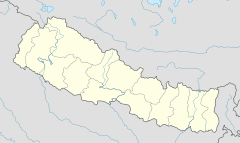Muktinath
| Muktinath Temple | |
|---|---|

Muktinath Temple
|
|
|
Location in Nepal
|
|
| Name | |
| Other names | Saligram |
| Geography | |
| Coordinates | 28°49′0″N 83°52′15″E / 28.81667°N 83.87083°ECoordinates: 28°49′0″N 83°52′15″E / 28.81667°N 83.87083°E |
| Country | Nepal |
| District | Mustang District |
| Location | Muktinath (Dhawalagiri) |
| Culture | |
| Primary deity | Muktinath |
| Consort | Sri Devi Thayaar |
| Festival deity | Sri Murthy |
| Temple tank | Gandaki River or Chakra Theertham |
| Shrine | Kanaka Vimanam |
| Architecture | |
| Architectural styles | Pagoda |
Muktinath is a sacred place for both Hindus and Buddhists located in Muktinath Valley at an altitude of 3,710 meters at the foot of the Thorong La mountain pass (part of the Himalayas) in Mustang, Nepal. The site is close to the village of Ranipauwa, which is sometimes mistakenly called Muktinath as well.
Within Hinduism, it is called Mukti Kshetra, which literally means the "place of liberation or moksha". This temple is considered to be the 106th among the available 108 Divya Desam, which are considered sacred by the Sri Vaishnava sect. The ancient name of this place in Sri Vaishnava literature, before Buddhist origin, is Thiru Saligramam. This houses the Saligrama shila, considered to be the naturally available form of Sriman Narayana— the Hindu Godhead. It is also one of the 51 Shakti peethams. The Buddhists call it Chumig Gyatsa, which in Tibetan means "Hundred Waters". Although the temple has a Vaishnava origin, it is also revered in Buddhism. For Tibetan Buddhists, Muktinath-Chumig Gyatsa is a very important place of Dakinis, goddesses known as Sky Dancers, and one of the 24 Tantric places. They understand the murti to be a manifestation of Avalokitesvara.
The central shrine of Sri Muktinath is considered one of the eight most sacred shrines for Hindu Vaishnavas, known as Svayam Vyakta Ksetras; the other seven being Srirangam, Srimushnam, Tirupati, Naimisharanya, Thotadri, Pushkar and Badrinath. The temple is very small. Muktinath is one of the most ancient Hindu temples of God Vishnu. The murti is of gold and is tall enough to compare with a man. The prakaram (outer courtyard) has 108 bull faces through which water is poured. It is at freezing temperature. The sacred water that flows in 108 pipes around the temple complex denotes all the sacred Pushkarini waters (Temple Tanks) from all the 108 Sri Vaishnava Divya Desams, including Srirangam, Tirumala and Vaikunta, where the devotees take their sacred bath even in the freezing temperatures. There is an old Buddhist monk present in the temple. The worship is conducted by Buddhists.
...
Wikipedia

